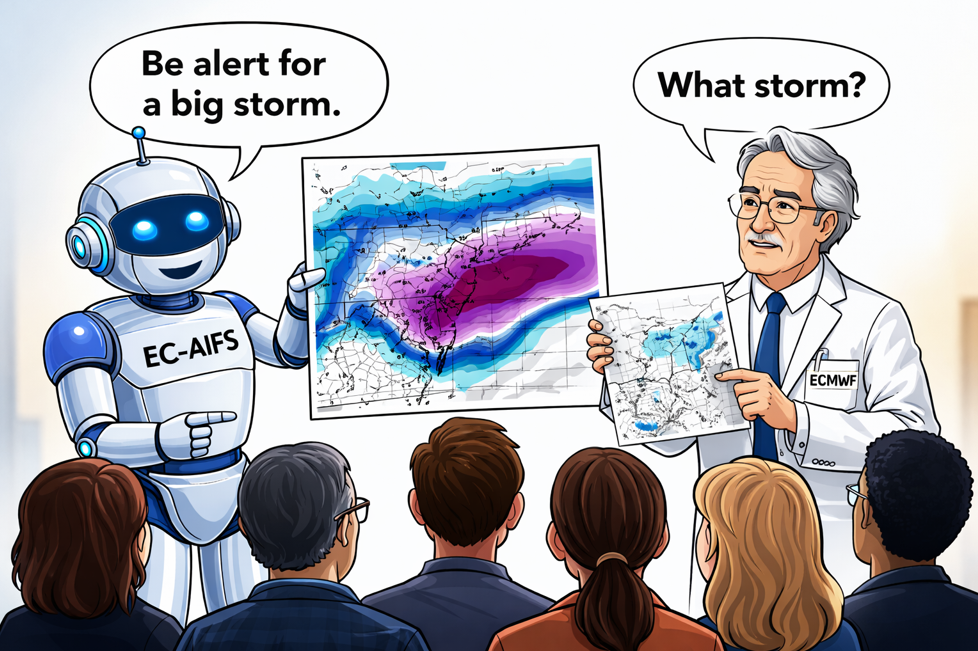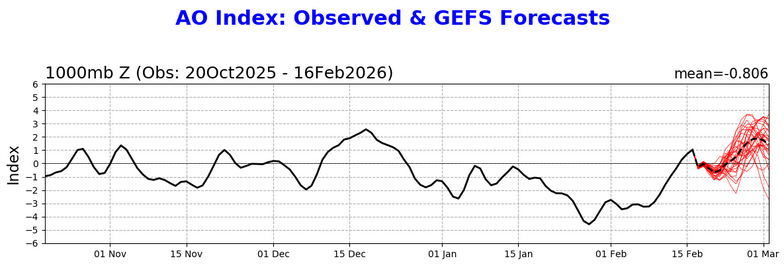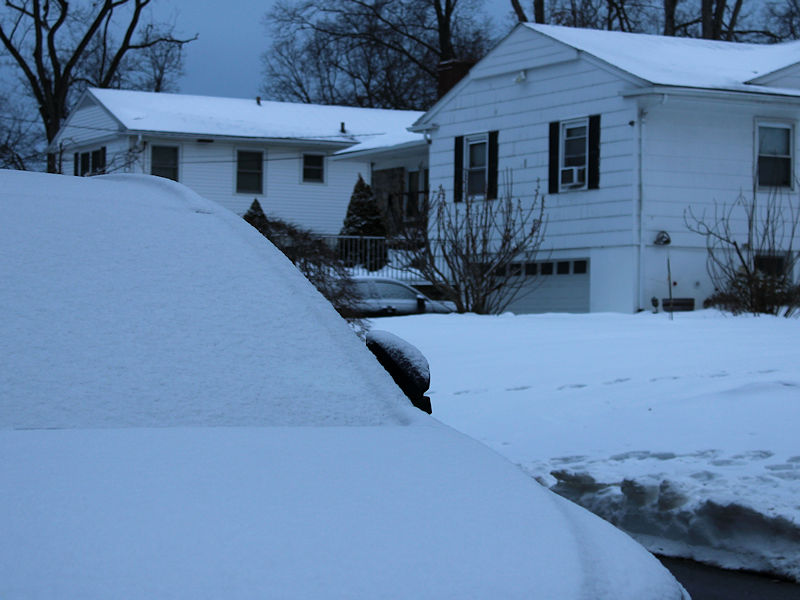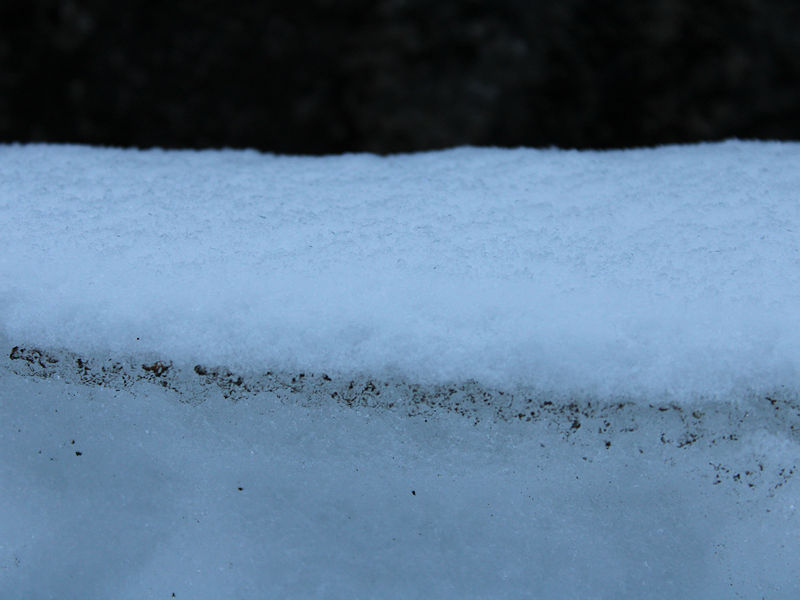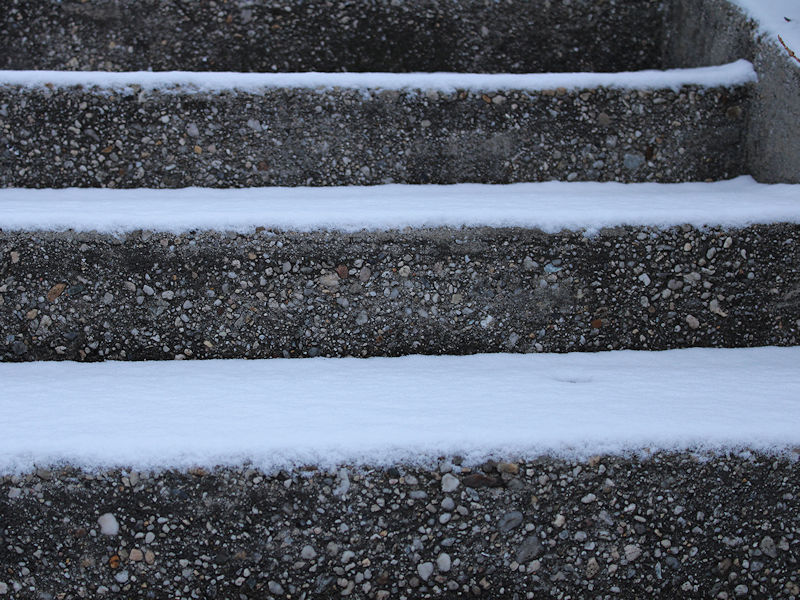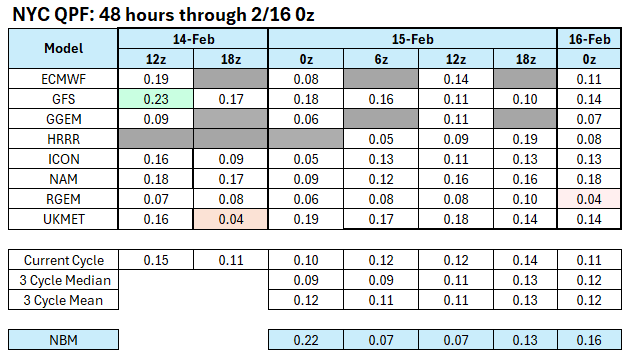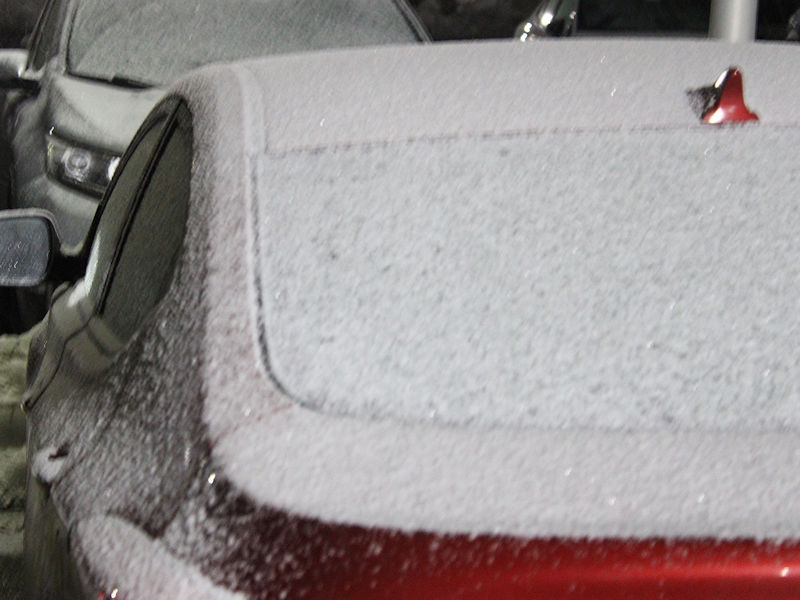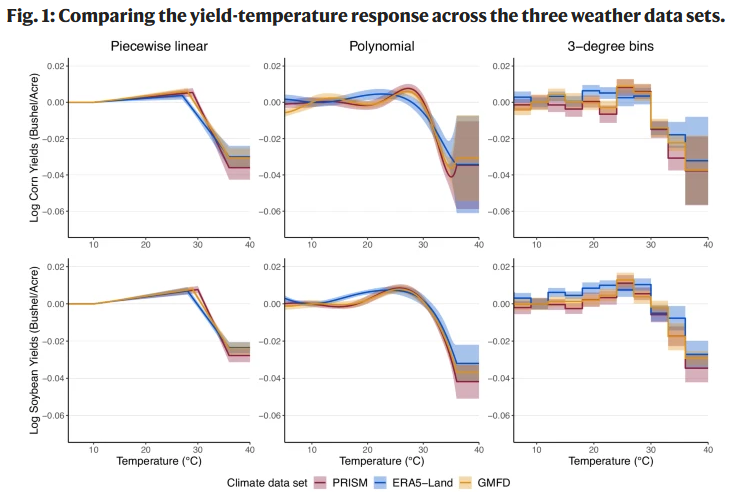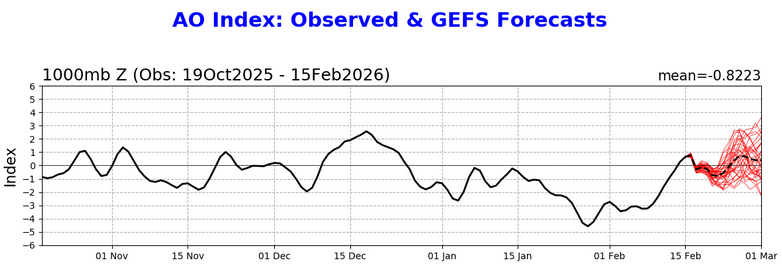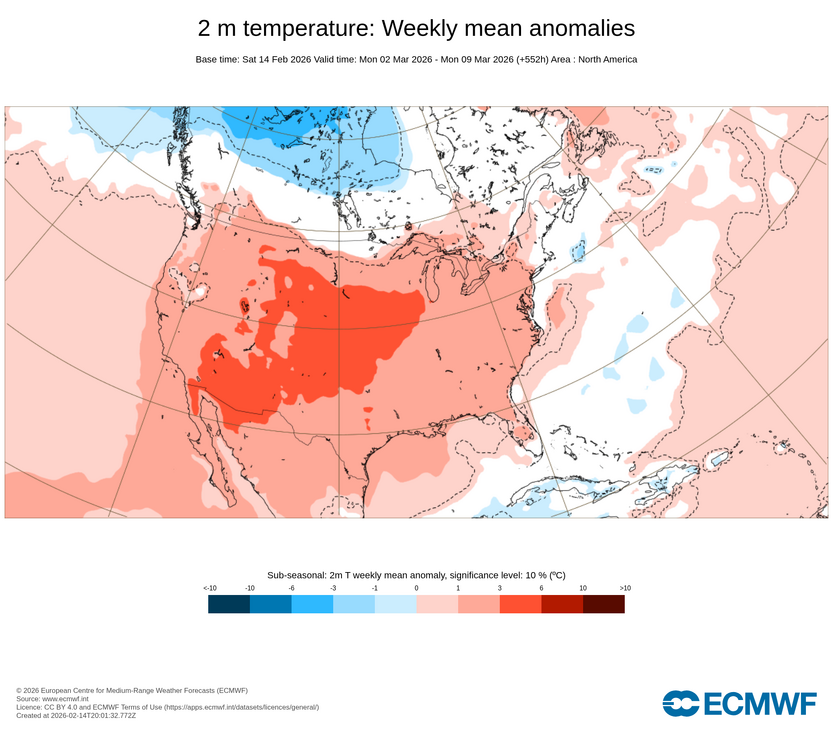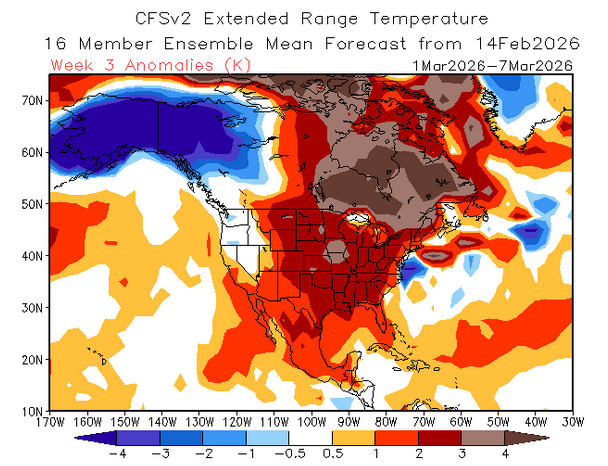-
Posts
23,742 -
Joined
Content Type
Profiles
Blogs
Forums
American Weather
Media Demo
Store
Gallery
Everything posted by donsutherland1
-

February 2026 OBS & Discussion
donsutherland1 replied to Stormlover74's topic in New York City Metro
In most cases, December 1 to mid-February, it isn't. But when wave lengths shorten, it becomes more favorable and the snowstorm stats speak for themselves. Two thirds of snowstorms with 10" or more snow in Boston, New York City, and/or Philadelphia during the second half of February occurred with a PNA-. -

February 2026 OBS & Discussion
donsutherland1 replied to Stormlover74's topic in New York City Metro
Following a foggy start, tomorrow will see highs reach the lower and perhaps middle 40s. Some rain showers or a period of rain is likely later tomorrow into early Thursday as a system streaks rapidly from Minnesota across central New York State and into New England. Parts of central New York State and southern/central New England, including Boston, could see some accumulating snow. Additional precipitation could arrive Friday or Saturday. Highs will likely reach the 40s through Saturday. Numerous ensemble members and operational models continue to suggest the potential for a significant or major snowstorm some time in the February 22-24 timeframe. More evidence in the form of model consensus and support from a large number of individual ensemble members will be needed before there can be reasonable confidence in such a solution. For now, one is dealing with a low probability but high-impact scenario. An AO-/PNA- pattern, which is forecast for the timeframe involved, has seen a number of significant or major snowstorms during the second half of February. Since 1950, New York City has seen four 6" or above snowstorms during such patterns, including the 1979 President's Day blizzard (12.7") and the February 25-26, 2010 snowstorm (20.9"). In contrast, during AO+/PNA- patterns, New York City has seen just one 6" or above snowstorm. Details should start to become clearer by Wednesday or Thursday. The ENSO Region 1+2 anomaly was +0.7°C and the Region 3.4 anomaly was -0.2°C for the week centered around February 11. For the past six weeks, the ENSO Region 1+2 anomaly has averaged -0.03°C and the ENSO Region 3.4 anomaly has averaged -0.47°C. Neutral ENSO conditions are now developing. Neutral ENSO conditions will develop during the close of winter. The SOI was +15.13 today. The preliminary Arctic Oscillation (AO) was -0.264 today. Based on sensitivity analysis applied to the latest guidance, there is an implied near 97% probability that New York City will have a cooler than normal February (1991-2020 normal). February will likely finish with a mean temperature near 31.5° (4.4° below normal). Supplemental Information: The projected mean would be 3.8 below the 1981-2010 normal monthly value. Overall, Winter 2025-2026 is on track for a seasonal mean temperature of 31.9°. That would be the lowest winter mean temperature since Winter 2014-2015 when the mean temperature was 31.7°. Winter 2025-2026 would only become the fourth winter of the 21st century with a mean temperature of 32.0° or below. -
-
Blizzard warnings are still provided. Only the watches were eliminated.
-
Blizzard watches were discontinued in late 2017.
-

Anyone having trouble paying the subscription?
donsutherland1 replied to MN Transplant's topic in Forum Information & Help
Yes. -

February 2026 OBS & Discussion
donsutherland1 replied to Stormlover74's topic in New York City Metro
The mean temperatures for those winters were: 1995-1996: 32.2° 2003-2004: 32.4° 2010-2011: 32.7° 2013-2014: 33.0° Finally, the reference to the last winter with a mean temperature of 32° or below should be to 2014-15, as shown in past posts. Apologies for the error. -

February 2026 OBS & Discussion
donsutherland1 replied to Stormlover74's topic in New York City Metro
1976-77 didn't make it, because the winter was frigid (28.3° seasonal mean temperature), but seasonal snowfall was below 30.0" (24.5"). -

February 2026 OBS & Discussion
donsutherland1 replied to Stormlover74's topic in New York City Metro
New York City remains on course for a winter season mean temperature of 32.0° or below. Much will depend on the warmup that will conclude February. The last time that happened was in 2014-2015. Some of the guidance and a number of individual ensemble members continue to suggest that the New York City area could experience a significant or major snowfall during the February 22-24 period. That's far from a done deal, despite support from the highest-ranked operational model, the ECMWF-AIFS. For now, the possible event is a low probability, high-impact scenario. The picture should become clearer later this week. To date, New York City has seen 22.3" of snow. 7.7" of additional snowfall would bring the seasonal figure to 30.0". Were that to happen, Winter 2025-2026 would be a special winter for its combination of snowfall and cold. The last five winters to see a seasonal mean temperature of 32.0° or below and 30.0" or more snowfall were 1960-1961, 1977-1978, 1993-1994, 2002-2003 and 2014-2015. -

February 2026 OBS & Discussion
donsutherland1 replied to Stormlover74's topic in New York City Metro
Even if I don't start the storm thread (and I hope we will have a storm to track), people can feel free to use any information I post. -

February 2026 OBS & Discussion
donsutherland1 replied to Stormlover74's topic in New York City Metro
Tomorrow will see highs reach the middle 40s. Some rain showers or a period of rain is likely on Wednesday into perhaps early Thursday as a system streaks rapidly from Minnesota across central New York State and into New England. Parts of central New York State and southern/central New England, including Boston, could see some accumulating snow. Additional precipitation could arrive Friday or Saturday. Highs will likely reach the 40s through Saturday. A few ensemble members (20% EPS members at 2/16 12z with 6" or more snow) and occasional operational runs (2/16 6z GFS and 12z Icon) have continued to suggest the potential for a significant or major snowstorm some time in the February 21-24 timeframe. More evidence in the form of model consensus and support from a large number of individual ensemble members will be needed before there can be reasonable confidence in such a solution. For now, one is dealing with a low probability but high-impact scenario. An AO-/PNA- pattern, which is forecast for the timeframe involved, has seen a number of significant or major snowstorms during the second half of February. Since 1950, New York City has seen four 6" or above snowstorms during such patterns, including the 1979 President's Day blizzard (12.7") and the February 25-26, 2010 snowstorm (20.9"). In contrast, during AO+/PNA- patterns, New York City has seen just one 6" or above snowstorm. Details should start to become clearer by Wednesday or Thursday. The ENSO Region 1+2 anomaly was +0.7°C and the Region 3.4 anomaly was -0.2°C for the week centered around February 11. For the past six weeks, the ENSO Region 1+2 anomaly has averaged -0.03°C and the ENSO Region 3.4 anomaly has averaged -0.47°C. Neutral ENSO conditions are now developing. Neutral ENSO conditions will develop during the close of winter. The SOI was +10.90 today. The preliminary Arctic Oscillation (AO) was +0.799 today. Based on sensitivity analysis applied to the latest guidance, there is an implied near 97% probability that New York City will have a cooler than normal February (1991-2020 normal). February will likely finish with a mean temperature near 31.5° (4.4° below normal). Supplemental Information: The projected mean would be 3.8 below the 1981-2010 normal monthly value. Overall, Winter 2025-2026 is on track for a seasonal mean temperature of 31.9°. That would be the lowest winter mean temperature since Winter 2014-2015 when the mean temperature was 31.7°. Winter 2025-2026 would only become the fourth winter of the 21st century with a mean temperature of 32.0° or below. -

2025-2026 ENSO
donsutherland1 replied to 40/70 Benchmark's topic in Weather Forecasting and Discussion
The latest AO forecast is even more aggressive with the development of an AO+: Given the other forecast teleconnections, this implies that the late February cold shot will likely be short-lived. Temperatures could return to near normal or above normal levels in the Great Lakes Region and Northeast in the closing days of the month. -

Presidents' day Snow potential
donsutherland1 replied to WeatherGeek2025's topic in New York City Metro
Numerous parts of Nassau County saw 2" or more of snow. Three photos from southern Westchester County where around 0.5" fell. -

Presidents' day Snow potential
donsutherland1 replied to WeatherGeek2025's topic in New York City Metro
Overnight, New York City received 0.08" of precipitation. The 0z HRRR followed closely by the 0z GGEM did best with the final amount. -

Presidents' day Snow potential
donsutherland1 replied to WeatherGeek2025's topic in New York City Metro
-

Presidents' day Snow potential
donsutherland1 replied to WeatherGeek2025's topic in New York City Metro
At 7 pm, Philadelphia was seeing light rain while snow flurries had moved into the Allentown area. The northern extent of the precipitation where it is raining should see the rain change to snow as the evening progresses. -

February 2026 OBS & Discussion
donsutherland1 replied to Stormlover74's topic in New York City Metro
I don't disagree. The linkage to Arctic amplification likely explains much of what has been observed. -

February 2026 OBS & Discussion
donsutherland1 replied to Stormlover74's topic in New York City Metro
A weak system will pass south of New York City tonight into early tomorrow. The temperature will likely remain near or above freezing during most of the event. Assuming a snow-liquid ratio of about 6:1 to 7:1 based on past cases with < 0.20" precipitation and lows of 31°-33° with a storm total 0.10"-0.15" QPF, New York City and nearby suburbs will likely see a coating to 1" of snow (probably 0.5”-1.0” in Central Park). A realistic high-case figure for New York City is 1.5". A few places across central New Jersey and Long Island could pick up 1"-3" of snow. Most amounts will be 2" or less in those areas. Following the light snowfall, the clouds will break and the temperature will top out in the lower 40s in New York City. Tuesday will also see highs reach the middle 40s. A warm front will cross the region on Wednesday with some rain showers or a period of rain but its progress could slow or stall. Additional precipitation could arrive Friday or Saturday. Highs will likely reach the 40s through Saturday. The ENSO Region 1+2 anomaly was +0.3°C and the Region 3.4 anomaly was -0.5°C for the week centered around February 4. For the past six weeks, the ENSO Region 1+2 anomaly has averaged -0.25°C and the ENSO Region 3.4 anomaly has averaged -0.52°C. La Niña conditions will likely continue into at least late winter. The SOI was +15.37 today. The preliminary Arctic Oscillation (AO) was +1.188 today. Based on sensitivity analysis applied to the latest guidance, there is an implied near 97% probability that New York City will have a cooler than normal February (1991-2020 normal). February will likely finish with a mean temperature near 31.4° (4.5° below normal). Supplemental Information: The projected mean would be 3.9° below the 1981-2010 normal monthly value. Overall, Winter 2025-2026 is on track for a seasonal mean temperature of 31.9°. That would be the lowest winter mean temperature since Winter 2014-2015 when the mean temperature was 31.7°. Winter 2025-2026 would only become the fourth winter of the 21st century with a mean temperature of 32.0° or below. -
Crop sizes being "hard to separate out" is his defense for setting aside the latest scientific research demonstrating a clear link with temperature. The statistical basis is sound.
-

February 2026 OBS & Discussion
donsutherland1 replied to Stormlover74's topic in New York City Metro
Considering the high amount of down time, perhaps there should be discussion about whether to replace rather than repair the radar. Downtime has been a recurrent theme since at least last summer. -
Here are two big problems with his arguments: He writes: Regarding all the articles from so called authorities that climate change is already cutting back on food production: 100% nonsense. It's the exact opposite. With crops, we can't tell how much impact is from CO2, climate/weather, genetics, fertilizers, use of pesticides/herbicides(technology). When you change numerous variables at the same time, like we do with crops, it's impossible to separate the impact from each one on the outcome. Flaw: He claims that "it's impossible to separate the impact" from CO2, climate/weather, genetics, etc. Yet, he also claims that the idea that climate change is "100% nonsense." That's inherently inconsistent logic. He also states: ...we have 2 ways to address that with OBJECTIVE data which clearly speaks for the impact of photosynthesis by itself and for photosynthesis +climate change. 1. The impact of JUST adding CO2 and not changing anything else... 2. But other human factors impact soybeans, including climate change that we can't separate out. Flaw: He oversimplifies things by ignoring the variable of temperature. Omitting temperature provides him the solution he seeks. However, cherry picking in pursuit of confirming one's biases is not a valid scientific approach. Recent research provides a clear link between temperature and crop yields. For example, a May 31, 2024 paper in Nature Communications found: All specifications and weather data uncover an asymmetric relationship for the US where yields are increasing in temperature for moderate temperature ranges, but sharply decrease in temperature at the upper end.
-

2025-2026 ENSO
donsutherland1 replied to 40/70 Benchmark's topic in Weather Forecasting and Discussion
As previously noted regarding the February 15-28 period, what was fairly certain were: 1) Substantial warmup in the Plains States. 2) Brief cool shot to the Southwest and then a return of warmer conditions. The cool shot likely won't be sufficient to preclude Phoenix from experiencing its warmest winter on record. The period has commenced with widespread above to much above normal readings in the Plains States. Phoenix is virtually certain to experience its warmest winter on record. Only one case saw in its period of record (1896-2025) saw a sufficiently cold February 15-28 that would miss the record. Nothing remotely close to that case is on the latest guidance. It was also noted that the Arctic Oscillation (AO) could hold the key to the overall outcome. The EPS and GEFS agree on the development of a WPO-, EPO+, PNA- pattern. During such patterns, conditions in the East tend to be much colder when the AO is negative than when it is positive. The latest AO forecast shows the AO returning to positive levels after a fairly short-lived dip to negative levels. The most recent ECMWF weeklies show a brief return to cooler conditions in parts of the East during February 23-March 2, but a return to above normal temperatures afterward unlike prior runs. The weeklies also show most of the CONUS experiencing above normal temperatures to start March. ECMWF Weeklies: The CFSv2, which was been showing above normal temperatures on a consistent basis, shows a warmer than normal first week of March. It's too soon to pronounce the end of Winter 2025-2026. There may yet be cold periods and snowfall, though the most severe cold is almost certainly behind us. But even if this latest guidance were to mark the end, many parts of the Northeast and Great Lakes Region had highlights that made this winter memorable, particularly sustained cold not seen for a decade or longer, long-lived snow cover, and from Philadelphia to Boston, a big snowstorm. -

2026-2027 El Nino
donsutherland1 replied to Stormchaserchuck1's topic in Weather Forecasting and Discussion
CANSIPS's limitations notwithstanding, ENSO forecasting skill at this lead time is low, especially when it comes to ENSO region details. If some of the ENSO guidance is correct, an El Niño could develop during the summer. That might inhibit tropical cyclone activity during the peak of hurricane season. Given ENSO forecasting challenges at the current lead time, a shortened/below normal Atlantic tropical cyclone season is a possible scenario but not yet assured. It does seem that this scenario is probably somewhat more likely than a highly active season. MJO forecasting skill is limited beyond 7-10 days due to its chaotic and convective nature. Speculation about predominant MJO phases next winter is nothing more than a wild guess. There is no skill whatsoever. Further, geothermal activity has no impact on ocean-atmosphere coupling and the synoptic patterns that result from such coupling. In sum, his idea of a cold Winter 2026-2027, which can't be made skillfully at the present lead time, is based on speculative propositions (the predominant MJO state more than three seasons in advance and geothermal, which has no linkage to weather/climate). This does not mean that there can't be a cold winter, but the nature of next winter cannot be forecast with any skill right now. -

February 2026 OBS & Discussion
donsutherland1 replied to Stormlover74's topic in New York City Metro
You raise important questions. The shift in the predominant storm tracks that you observed may be the result of an ongoing structural shift in storm tracks rather than periodic cycles. Many factors are involved, including cyclical ones, but there is at least some evidence that Arctic amplification is contributing. https://journals.ametsoc.org/view/journals/clim/30/10/jcli-d-16-0650.1.xml I still suspect that by the mid-2030s, we'll have a lot more answers related to regional snowfall, etc. -

February 2026 OBS & Discussion
donsutherland1 replied to Stormlover74's topic in New York City Metro
Parts of the region saw a dusting of snow overnight. The remainder of the day was mild with the temperature reaching the lower and middle 40s. Tomorrow will be a bit cooler with highs in the upper 30s. A storm tracking to the south could bring some snowfall to the region tomorrow night into Monday. The steadiest precipitation should pass to the south of New York City. Nevertheless, a 1"-2" snowfall appears likely in and around New York City. Lesser amounts are likely north and west of the City. Parts of central New Jersey and Long Island could see somewhat higher amounts. There remains a risk of lower amounts from New York City northward, as the City will be affected by the northern edge of a fairly weak system. Following the light snowfall, the remainder of Monday will see highs in the upper 30s and lower 40s. It will then turn milder for the remainder of the week into the beginning of next weekend. Highs will mainly be in the middle 40s. One or two days with highs in the upper 40s to near 50° are possible. The ENSO Region 1+2 anomaly was +0.3°C and the Region 3.4 anomaly was -0.5°C for the week centered around February 4. For the past six weeks, the ENSO Region 1+2 anomaly has averaged -0.25°C and the ENSO Region 3.4 anomaly has averaged -0.52°C. La Niña conditions will likely continue into at least late winter. The SOI was +20.94 today. The preliminary Arctic Oscillation (AO) was +0.006 today. Based on sensitivity analysis applied to the latest guidance, there is an implied near 95% probability that New York City will have a cooler than normal February (1991-2020 normal). February will likely finish with a mean temperature near 31.5° (4.4° below normal). Supplemental Information: The projected mean would be 3.8° below the 1981-2010 normal monthly value. Overall, Winter 2025-2026 is on track for a seasonal mean temperature of 31.9°. That would be the lowest winter mean temperature since Winter 2014-2015 when the mean temperature was 31.7°. Winter 2025-2026 would only become the fourth winter of the 21st century with a mean temperature of 32.0° or below.




